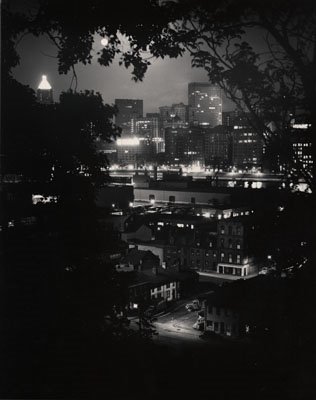My life's calling, setting fires.
Here in a hearth so huge
I can stand inside and shove
the wood around with my
bare hands while church bells
deal the hours down through
the chimney. No more
woodcutter, creel for the fire
or architect, the five staves
pitched like rifles over stone.
But to be mistro-elemental.
The flute of clay playing
my breath that riles the flames,
the fire risen to such dreaming
sung once from landlords' attics.
Sung once the broken lyres,
seasoned and green.
Even the few things I might save,
my mother's letters,
locks of my children's hair
here handed over like the keys
to a foreclosure, my robes
remanded, and furniture
dragged out into the yard,
my bedsheets hoisted up the pine,
whereby the house sets sail.
And I am standing on a cliff
above the sea, a paper light,
a lantern. No longer mine
to count the wrecks.
Who rode the ships in ringing,
marrying rock the waters
storm to break the door,
looked through the fire, beheld
a clearing there. This is what
you are. What you've come to.
Comment: Poet Deborah Digges committed suicide last week. I had
never heard of Ms. Digges, but after reading her obituary and a few
of her poems I would like to learn more. Poet Sharon Olds was asked
to name a personally meaningful book of poetry and she named
Digges' last book of poetry Trapeze. I'm sorry to be posting all of
these morbid suicide notices (note to self: a disproportionate number
of poets either off themselves or live VERYtroubled lives), but on the
bright side these gifted people live on in their work. Digges also wrote
two memoirs. Fugitive Spring is about her childhood in Missouri,
growing up one of 10 children and The Stardust Lounge is about
her relationship with her teenage son.
I'm struggling with the middle of the poem:
The flute of clay playing
my breath that riles the flames,
the fire risen to such dreaming
sung once from landlords' attics.
Sung once the broken lyres,
seasoned and green.
I've read this over and over again and can't really picture or
comprehend what the poet is saying and how it relates to the
rest of the poem. What are "landlords' attics"? And why would
she say "flute of clay"? Is that literally the same as "clay flute"?
But the finale of the poem is quite fantastic. She marries
everyday things you can picture instantly like locks from her
children's hair with the dramatic sea/cliff imagery.


I am not sure what the "flutes of clay" means, but it reminds me of the "feet of clay" quote and makes me wonder if she is trying to evoke that familiar quote---especially since it seems to work with her general theme of the sort of everyday with the dramatic. It seems that the whole section is a marrying of things broken, borrowed, unstable, earthly with something more ephemeral. The lyres are broken, she's singing from the landlord's attic (not something she owns but something that someone else owns) which is "mortgaged".
ReplyDeletehere's the original bible quote:
“ Thou, O king, sawest, and behold a great image ... his feet part of iron and part of clay. ... And as the toes of the feet were part of iron, and part of clay, so the kingdom shall be partly strong, and partly broken. ”
I dunno, I didn't read the rest of the poem very closely, but, it's food for thought :-)
Welcome, urbansardines! Thanks so much for your thoughts. They actually helped a lot in deciphering the imagery of the poem. You also inspired me to read the poem again and more carefully and now I can piece all the imagery together. It's of someone really being born again from the flames, like a phoenix. But not without her victims and all the things from the old self that she must leave behind to start anew. To be, I guess, truer to herself. I agree with your observation of all the "broken" things within the poem. Perhaps "flute of clay" is in reference to "feet of clay." These things we think of as stable and steadfast, like our lives or our inner selves are really sometimes just flimsy walls we have built and all that is left after the destruction is a spirit that can not be tied down to something like a hearth. In order for the narrator to set herself free she must give up everything that made her old life meaningful but also pinned her to one place.
ReplyDeleteThe spirit of this poem reminds me a lot of a book I've been reading on the life and work of photographer Dorothea Lange. The book is actually called "Restless Spirit". I think this is a dilemma so many women artists face. As women, we either choose to or are socially pressured into being tied to hearth and home, to children and family. It goes without saying that once a woman becomes a mother, her responsibilities extend beyond just her wants and desires. But the artist is a restless spirit who needs to explore and roam, experience and have time to contemplate and work. All demands that are often an uneasy fit with motherhood and married life. What if your art is so consuming it leaves little room for anything else? What does that make you? Are you the worst sin of all? A bad mother? You'd think in 2009 we wouldn't be asking these questions, but we still are. These are still relevant questions. When I read about Dorothea Lange's inner struggle, as a woman, I root for her as an artist, but as a mother myself, I want her to stand by her children as well. Somehow, in Digges' poem I sense the same struggle. These deep meaningful connections we have in our lives as women (the relationship with our mothers, our relationship with our children) are also in a sense our greatest shackles. The poet imagines the possibilities of a life free of these connections. And fittingly, the conclusion is both scary and exhilarating.